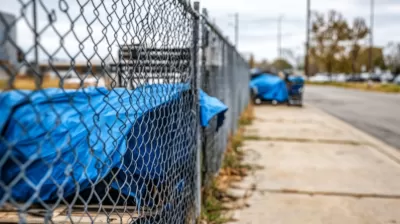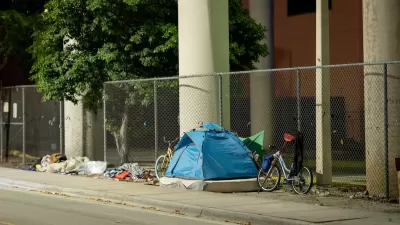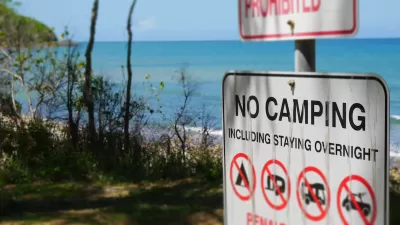A Supreme Court ruling in the case of Grants Pass v. Johnson has led over 100 cities to pass or step up enforcement of camping bans that criminalize unhoused residents.

A Supreme Court ruling from earlier this year in the case of Grants Pass, Oregon v. Johnson that allows cities to criminalize homelessness even when no shelter beds are available is having widespread repercussions across the country, reports Jennifer Ludden for KSMU.
According to Ludden, over 100 municipalities have passed or strengthened camping bans since the ruling. “So far, in the months since the ruling, some places with aggressive new camping bans have ramped up fines and arrests.”
Advocates for the unhoused say punitive policies only exacerbate the problem, pushing people out of safe spaces and making it harder to connect them to services. “Some cities have held firm against the Supreme Court ruling. The most prominent is Los Angeles, where Mayor Karen Bass has pushed to move people temporarily into motels and touted success after the number of people living on the streets dropped 10% this year.” But despite renewed efforts to build new shelter beds, most U.S. cities remain short.
FULL STORY: 100-plus cities in the U.S. banned homeless camping this year. But will it work?

Trump Administration Could Effectively End Housing Voucher Program
Federal officials are eyeing major cuts to the Section 8 program that helps millions of low-income households pay rent.

Planetizen Federal Action Tracker
A weekly monitor of how Trump’s orders and actions are impacting planners and planning in America.

Ken Jennings Launches Transit Web Series
The Jeopardy champ wants you to ride public transit.

Crime Continues to Drop on Philly, San Francisco Transit Systems
SEPTA and BART both saw significant declines in violent crime in the first quarter of 2025.

How South LA Green Spaces Power Community Health and Hope
Green spaces like South L.A. Wetlands Park are helping South Los Angeles residents promote healthy lifestyles, build community, and advocate for improvements that reflect local needs in historically underserved neighborhoods.

Sacramento Plans ‘Quick-Build’ Road Safety Projects
The city wants to accelerate small-scale safety improvements that use low-cost equipment to make an impact at dangerous intersections.
Urban Design for Planners 1: Software Tools
This six-course series explores essential urban design concepts using open source software and equips planners with the tools they need to participate fully in the urban design process.
Planning for Universal Design
Learn the tools for implementing Universal Design in planning regulations.
Heyer Gruel & Associates PA
Ada County Highway District
Institute for Housing and Urban Development Studies (IHS)
City of Grandview
Harvard GSD Executive Education
Toledo-Lucas County Plan Commissions
Salt Lake City
NYU Wagner Graduate School of Public Service





























